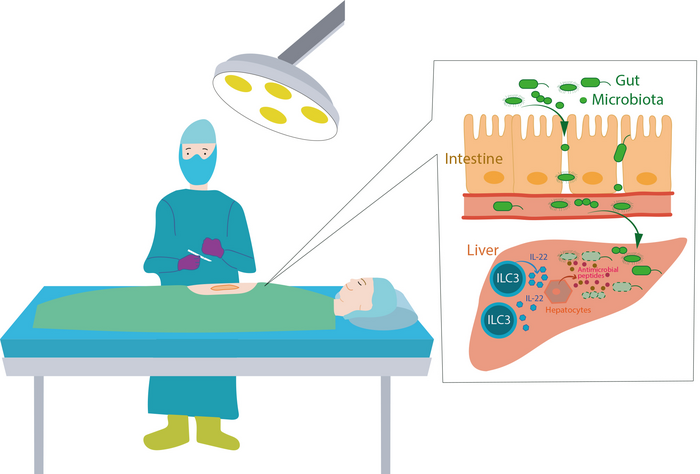Nearly 16 million operations were performed on inpatients in German hospitals in 2021. In Switzerland, the figure is around 1.1 million. Even if the actual operation goes well, it is not uncommon for a wound infection to occur afterwards, which can have dramatic consequences for those affected. In extreme cases, such infections are fatal.

Credit: Mercedes Gomez de Agüero
Nearly 16 million operations were performed on inpatients in German hospitals in 2021. In Switzerland, the figure is around 1.1 million. Even if the actual operation goes well, it is not uncommon for a wound infection to occur afterwards, which can have dramatic consequences for those affected. In extreme cases, such infections are fatal.
A new study now shows: In most cases, the causative agents of these infections are bacteria from the patient’s own intestine. For this, the intestine does not even have to be injured during the operation. Even so, these pathogens overcome the intestinal barrier postoperatively and spread throughout the body via the bloodstream and lymphatic vessels. They can be stopped by special immune cells, which patrol all organs, including the liver.
A better understanding of side infections
This study was published in the current issue of the journal Cell Reports. Jointly responsible for this are Professor Guido Beldi, Chief of Visceral Surgery at the University Hospital for Visceral Surgery and Medicine at Inselspital in Bern, and Dr. Mercedes Gomez de Agüero, head of a junior research group at the Institute of Systems Immunology at Julius-Maximilians-Universität Würzburg (JMU).
“It has long been known that side infections increase mortality during invasive procedures. For this reason, extensive hygiene and asepsis measures are implemented to eliminate microorganisms in the surgical field,” explains Guido Beldi. As it now turns out, however, the danger comes from a completely different corner: the patient’s intestine.
100 trillion microorganisms live in the intestine
“Several hundred strains of different bacteria with around one hundred trillion microorganisms live in the human intestine. They form the natural intestinal flora, also called the microbiome,” Gomez de Agüero explains. Their existence is beneficial to humans: they help with digestion, eliminate pathogens and train the immune system. However, this only applies as long as these bacteria do not overcome the so-called intestinal barrier and spread throughout the body.
However, this is exactly what can happen after a surgical procedure: “In our study, we analyzed the microorganisms that caused side infections in almost 4,000 patients after a major surgical procedure,” explains Guido Beldi. It showed that in virtually all cases, the infectious agents were bacteria from the patient’s intestine, such as Enterococcus, Escherichia coli and Clostridium.
They most frequently caused infections after operations on the liver, pancreas and bile ducts, as well as during operations on the small and large intestine. In particular, patients who underwent major liver resection – the removal of large parts of the liver – suffered such infections, which significantly delayed the healing process.
Important players are located in the liver
The researchers were able to demonstrate in the mouse model that the liver actually plays a special role in this infection process: “We know that special cells of the immune system that reside in the liver are responsible for controlling these spreading bacteria and for the healing process after major surgery,” says Gomez de Agüero. They are a group of lymphocytes called innate lymphoid cells (ILCs), which are important players in the innate immune system.
If bacteria from the intestine enter the liver via the bloodstream, these ILCs are activated and release special messenger substances, such as interleukin 22, a protein that can trigger and regulate immune reactions. In this way, they stimulate liver cells to produce antimicrobial substances. “In this way, innate lymphoid cells residing in the liver control the systemic spread of intestinal bacteria and effectively combat side infections after surgery.
“Boosting immunity thus represents a useful prophylactic and therapeutic alternative strategy to standard antimicrobial therapies to prevent concomitant infections after surgery,” suggests Guido Beldi. At least until it has been clarified which factors are responsible for the intestinal barrier no longer preventing intestinal bacteria from invading the interior of the body after a surgical intervention. The research team now wants to investigate these questions.
The Insel Group
The Insel Group is Switzerland’s leading hospital group for university and integrated medicine. It offers people comprehensive healthcare by means of pioneering quality, research, innovation and education: in all phases of life, around the clock and in the right place. The Insel Group provides over 900,000 outpatient consultations annually and treats around 62,000 inpatients using the latest therapeutic methods. The Insel Group is a training center for a variety of professions and an important institution for the continuing education of young physicians. More than 12,000 employees (including apprentices) work at the Insel Group.
The Institute of Systems Immunology
The Institute of Systems Immunology has its roots in the Max Planck Research Group for Systems Immunology – a joint initiative of the University of Würzburg and the Max Planck Society with the aim of promoting excellent immunological research. It is headed by Professors Wolfgang Kastenmüller, holder of the Chair of Systems Immunology I, and Georg Gasteiger, holder of the Chair of Systems Immunology II.
About 50 scientists from more than 20 countries are now working at the Institute of Systems Immunology. The common goal is to understand the fundamentals of a successful immune response against infectious agents, chronic inflammatory diseases and tumors in order to develop new concepts and strategies for vaccines and immunotherapies.
Journal
Cell Reports
DOI
10.1016/j.celrep.2023.112269
Method of Research
Observational study
Subject of Research
Cells
Article Title
ILC3s restrict the dissemination of intestinal bacteria to safeguard liver regeneration after surgery
Article Publication Date
17-Mar-2023
COI Statement
The authors declare no competing interests.




